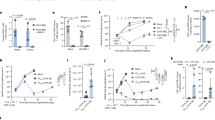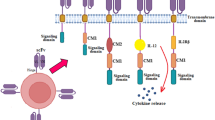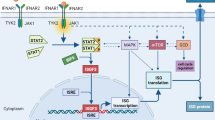Abstract
Purpose
The immunological processes underlying immunogenicity of recombinant human therapeutics are poorly understood. Using an immune tolerant mouse model we previously demonstrated that aggregates are a major trigger of the antidrug antibody (ADA) response against recombinant human interferon beta (rhIFNβ) products including Betaferon®, and that immunological memory seems to be lacking after a rechallenge with non-aggregated rhIFNβ. The apparent absence of immunological memory indicates a CD4+ T-cell independent (Tind) immune response underlying ADA formation against Betaferon®. This hypothesis was tested.
Methods
Using the immune tolerant mouse model we first validated that rechallenge with highly aggregated rhIFNβ (Betaferon®) does not lead to a subsequent fast increase in ADA titers, suggesting a lack of immunological memory. Next we assessed whether Betaferon® could act as Tind antigen by inactivation of marginal zone (MZ) B-cells during treatment. MZ B-cells are major effector cells involved in a Tind immune response. In a following experiment we depleted the mice from CD4+ T-cells to test their involvement in the ADA response against Betaferon®.
Results
Inactivation of MZ B-cells at the start of Betaferon® treatment drastically lowered ADA levels, suggesting a Tind immune response. However, persistent depletion of CD4+ T-cells before and during Betaferon® treatment abolished the ADA response in almost all mice.
Conclusion
The immune response against rhIFNβ in immune tolerant mice is neither a T-cell independent nor a classical T-cell dependent immune response. Further studies are needed to confirm absence of immunological memory (cells).




Similar content being viewed by others
References
Subramanyam M. Immunogenicity of biotherapeutics-an overview. J Immunotoxicol. 2006;3:151–6.
Schellekens H. How to predict and prevent the immunogenicity of therapeutic proteins. Biotechnol Annu Rev. 2008;14:191–202.
Cohen BA, Oger J, Gagnon A, Giovannoni G. The implications of immunogenicity for protein-based multiple sclerosis therapies. J Neurol Sci. 2008;275:7–17.
McKoy JM, Stonecash RE, Cournoyer D, Rossert J, Nissenson AR, Raisch DW, Casadevall N, Bennett CL. Epoetin-associated pure red cell aplasia: past, present, and future considerations. Transfusion. 2008;48:1754–62.
Bartelds GM, Krieckaert CLM, Nurmohamed MT, van Schouwenburg PA, Lems WF, Twisk JWR, Dijkmans BAC, Aarden L, Wolbink GJ. Development of antidrug antibodies against adalimumab and association with disease activity and treatment failure during long-term follow-up. JAMA. 2011;305:1460–8.
Sauerborn M, Brinks V, Jiskoot W, Schellekens H. Immunological mechanism underlying the immune response to recombinant human protein therapeutics. Trends Pharmacol Sci. 2010;31:53–9.
Hermeling S, Aranha L, Damen JMA, Slijper M, Schellekens H, Crommelin DJA, Jiskoot W. Structural characterization and immunogenicity in wild-type and immune tolerant mice of degraded recombinant human interferon alpha2b. Pharm Res. 2005;22:1997–2006.
van Beers MMC, Sauerborn M, Gilli F, Brinks V, Schellekens H, Jiskoot W. Aggregated recombinant human interferon Beta induces antibodies but no memory in immune-tolerant transgenic mice. Pharm Res. 2010;27:1812–24.
van Beers MMC, Sauerborn M, Gilli F, Brinks V, Schellekens H, Jiskoot W. Oxidized and aggregated recombinant human interferon beta is immunogenic in human interferon beta transgenic mice. Pharm Res. 2011;28:2393–402.
Runkel L, Meier W, Pepinsky RB, Karpusas M, Whitty A, Kimball K, Brickelmaier M, Muldowney C, Jones W, Goelz SE. Structural and functional differences between glycosylated and non-glycosylated forms of human interferon-beta (IFN-beta). Pharm Res. 1998;15:641–9.
Aarskog NK, Marøy T, Myhr K-M, Vedeler CA. Antibodies against interferon-beta in multiple sclerosis. J Neuroimmunol. 2009;212:148–50.
Perini P, Facchinetti A, Bulian P, Massaro AR, Pascalis DD, Bertolotto A, Biasi G, Gallo P. Interferon-beta (INF-beta) antibodies in interferon-beta1a- and interferon-beta1b-treated multiple sclerosis patients. Prevalence, kinetics, cross-reactivity, and factors enhancing interferon-beta immunogenicity in vivo. Eur Cytokine Netw. 2001;12:56–61.
Ahlers JD, Belyakov IM. Molecular pathways regulating CD4(+) T cell differentiation, anergy and memory with implications for vaccines. Trends Mol Med. 2010;16:478–91.
Vos Q, Lees A, Wu ZQ, Snapper CM, Mond JJ. B-cell activation by T-cell-independent type 2 antigens as an integral part of the humoral immune response to pathogenic microorganisms. Immunol Rev. 2000;176:154–70.
van Beers MMC, Sauerborn M, Gilli F, Hermeling S, Brinks V, Schellekens H, Jiskoot W. Hybrid transgenic immune tolerant mouse model for assessing the breaking of B cell tolerance by human interferon beta. J Immunol Methods. 2010;352:32–7.
Hermeling S, Jiskoot W, Crommelin D, Bornaes C, Schellekens H. Development of a transgenic mouse model immune tolerant for human interferon Beta. Pharm Res. 2005;22:847–51.
Scheikl T, Reis B, Pfeffer K, Holzmann B, Beer S. Reduced notch activity is associated with an impaired marginal zone B cell development and function in Sly1 mutant mice. Mol Immunol. 2009;46:969–77.
Belperron AA, Dailey CM, Booth CJ, Bockenstedt LK. Marginal zone B-cell depletion impairs murine host defense against Borrelia burgdorferi infection. Infect Immun. 2007;75:3354–60.
Hardy RR, Hayakawa K. B cell development pathways. Annu Rev Immunol. 2001;19:595–621.
Cerottini JC, MacDonald HR. The cellular basis of T-cell memory. Annu Rev Immunol. 1989;7:77–89.
Sprent J. T and B memory cells. Cell. 1994;76:315–22.
Mirshahidi S, Huang CT, Sadegh-Nasseri S. Anergy in peripheral memory CD4(+) T cells induced by low avidity engagement of T cell receptor. J Exp Med. 2001;194:719–31.
Koch G, Lok BD, Benner R. Antibody formation in mouse bone marrow during secondary type responses to various thymus-independent antigens. Immunobiology. 1982;163:484–96.
Sverremark E, Fernandez C. Unresponsiveness following immunization with the T-cell-independent antigen dextran B512. Can it be abrogated? Immunology. 1998;95:402–8.
Martin F, Kearney JF. B-cell subsets and the mature preimmune repertoire. Marginal zone and B1 B cells as part of a “natural immune memory”. Immunol Rev. 2000;175:70–9.
Zandvoort A, Timens W. The dual function of the splenic marginal zone: essential for initiation of anti-TI-2 responses but also vital in the general first-line defense against blood-borne antigens. Clin Exp Immunol. 2002;130:4–11.
Haniuda K, Nojima T, Ohyama K, Kitamura D. Tolerance induction of IgG + memory B cells by T cell-independent type II antigens. J Immunol. 2011;186:5620–8.
Mond JJ, Lees A, Snapper CM. T cell-independent antigens type 2. Annu Rev Immunol. 1995;13:655–92.
Letvin NL, Benacerraf B, Germain RN. B-lymphocyte responses to trinitrophenyl-conjugated Ficoll: requirement for T lymphocytes and Ia-bearing adherent cells. Proc Natl Acad Sci USA. 1981;78:5113–7.
Nordin AA, Schreier MH. T cell control of the antibody response to the T-independent antigen. DAGG-Ficoll. J Immunol. 1982;129:557–62.
Mongini PK, Stein KE, Paul WE. T cell regulation of IgG subclass antibody production in response to T-independent antigens. J Exp Med. 1981;153:1–12.
De Groot AS, Martin W. Reducing risk, improving outcomes: bioengineering less immunogenic protein therapeutics. Clin Immunol. 2009;131:189–201.
Acknowledgements
This research was financially supported by the European Community under its 6th Framework (project NABINMS, contract number 018926). The authors would like to thank Darren Baker and Susan Goelz from Biogen Idec Inc for kindly supplying bulk recombinant human interferon beta 1a.
Conflict of interest
The authors declare that they have no conflict of interest.
Author information
Authors and Affiliations
Corresponding author
Rights and permissions
About this article
Cite this article
Sauerborn, M., van Beers, M.M.C., Jiskoot, W. et al. Antibody Response Against Betaferon® in Immune Tolerant Mice: Involvement of Marginal Zone B-cells and CD4+ T-cells and Apparent Lack of Immunological Memory. J Clin Immunol 33, 255–263 (2013). https://doi.org/10.1007/s10875-012-9783-z
Received:
Accepted:
Published:
Issue Date:
DOI: https://doi.org/10.1007/s10875-012-9783-z




